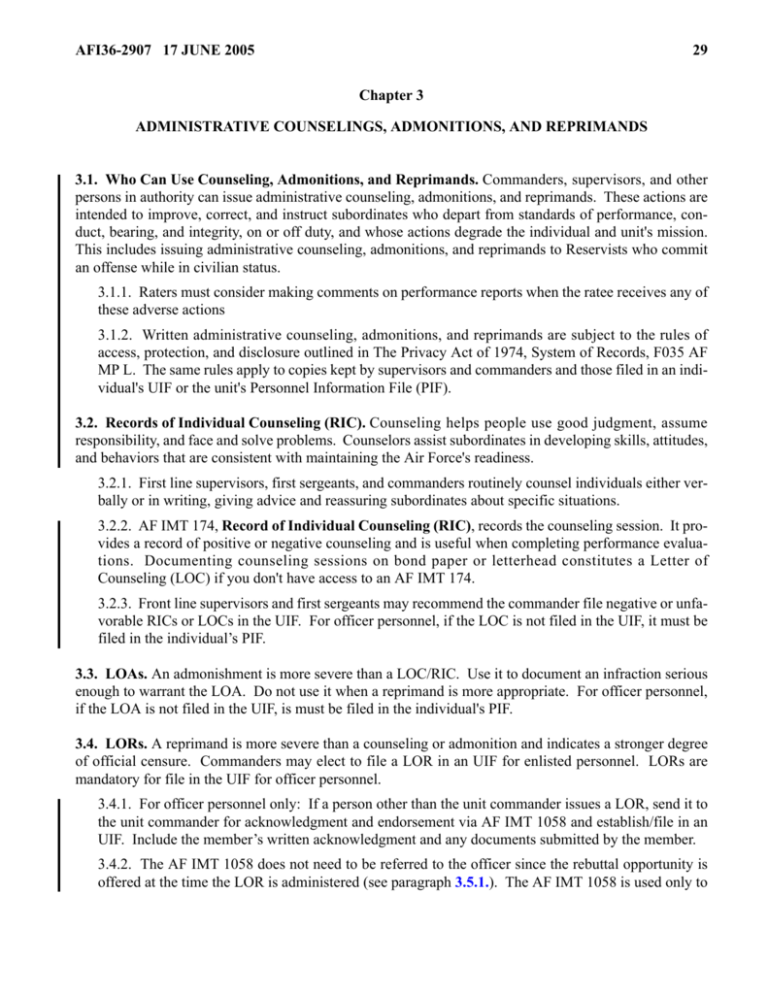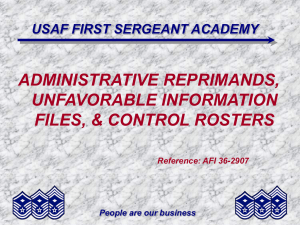AFI 36-2907 UIF Program - Kent State University Main Page
advertisement

AFI36-2907 17 JUNE 2005 29 Chapter 3 ADMINISTRATIVE COUNSELINGS, ADMONITIONS, AND REPRIMANDS 3.1. Who Can Use Counseling, Admonitions, and Reprimands. Commanders, supervisors, and other persons in authority can issue administrative counseling, admonitions, and reprimands. These actions are intended to improve, correct, and instruct subordinates who depart from standards of performance, conduct, bearing, and integrity, on or off duty, and whose actions degrade the individual and unit's mission. This includes issuing administrative counseling, admonitions, and reprimands to Reservists who commit an offense while in civilian status. 3.1.1. Raters must consider making comments on performance reports when the ratee receives any of these adverse actions 3.1.2. Written administrative counseling, admonitions, and reprimands are subject to the rules of access, protection, and disclosure outlined in The Privacy Act of 1974, System of Records, F035 AF MP L. The same rules apply to copies kept by supervisors and commanders and those filed in an individual's UIF or the unit's Personnel Information File (PIF). 3.2. Records of Individual Counseling (RIC). Counseling helps people use good judgment, assume responsibility, and face and solve problems. Counselors assist subordinates in developing skills, attitudes, and behaviors that are consistent with maintaining the Air Force's readiness. 3.2.1. First line supervisors, first sergeants, and commanders routinely counsel individuals either verbally or in writing, giving advice and reassuring subordinates about specific situations. 3.2.2. AF IMT 174, Record of Individual Counseling (RIC), records the counseling session. It provides a record of positive or negative counseling and is useful when completing performance evaluations. Documenting counseling sessions on bond paper or letterhead constitutes a Letter of Counseling (LOC) if you don't have access to an AF IMT 174. 3.2.3. Front line supervisors and first sergeants may recommend the commander file negative or unfavorable RICs or LOCs in the UIF. For officer personnel, if the LOC is not filed in the UIF, it must be filed in the individual’s PIF. 3.3. LOAs. An admonishment is more severe than a LOC/RIC. Use it to document an infraction serious enough to warrant the LOA. Do not use it when a reprimand is more appropriate. For officer personnel, if the LOA is not filed in the UIF, is must be filed in the individual's PIF. 3.4. LORs. A reprimand is more severe than a counseling or admonition and indicates a stronger degree of official censure. Commanders may elect to file a LOR in an UIF for enlisted personnel. LORs are mandatory for file in the UIF for officer personnel. 3.4.1. For officer personnel only: If a person other than the unit commander issues a LOR, send it to the unit commander for acknowledgment and endorsement via AF IMT 1058 and establish/file in an UIF. Include the member’s written acknowledgment and any documents submitted by the member. 3.4.2. The AF IMT 1058 does not need to be referred to the officer since the rebuttal opportunity is offered at the time the LOR is administered (see paragraph 3.5.1.). The AF IMT 1058 is used only to 30 AFI36-2907 17 JUNE 2005 obtain the commander’s acknowledgment of the action (for LORs administered by personnel other than the commander) and to refer the LOR for file in the UIF. 3.5. Administering RICs, LOCs, LOAs, or LORs. 3.5.1. Administer a counseling, admonition, or reprimand, verbally or in writing. If written, the letter states: 3.5.1.1. What the member did or failed to do, citing specific incidents and their dates. 3.5.1.2. What improvement is expected. 3.5.1.3. That further deviation may result in more severe action. 3.5.1.4. That the individual has 3 duty days to submit rebuttal documents for consideration by the initiator. For Non-EAD Reservists: the individual has 30 calendar days from the date of receipt of the certified letter, to acknowledge the notification, intended actions, and provide pertinent information before the commander makes the final decision. In calculating the time to respond, the date of receipt is not counted, and if the individual mails their acknowledgment, the date of the postmark on the envelope will serve as the date of acknowledgment. An individual is presumed to be in receipt of official correspondence if it is delivered by certified mail to the individual's address or best available address. 3.5.1.5. That all supporting documents received from the individual will become part of the record. 3.5.1.6. The person who initiates the RIC, LOC, LOA, or LOR has 3 duty days to advise the individual of their final decision regarding any comments submitted by the individual. For Non-EAD Reservists: the initiator has 30 calendar days from the date of receipt of the certified letter to reply to the member. 3.5.2. The person who initiates a RIC/LOC, LOA, or LOR may send it to the member's commander or superiors for information, action, or for their approval for file in the UIF or PIF. Include the member's written acknowledgment and any documents submitted by the member. For officers, LORs must be filed in the UIF, and any LOAs or LOCs not filed in the UIF, must be filed in the officer's PIF. 3.5.3. The person who initiates a LOA or LOR for a general officer or general officer select will forward the original document and attachments to AFSLMO or RESOMO for distribution to the commander. Mailing addresses are listed in paragraph 1.3.4.3. or 1.9.4. 3.6. Forms Prescribed. AF Form 174, Record of Individual Counseling, AF Form 1058, Unfavorable Information File Actions, and AF Form 1137, Unfavorable Information File Summary. ROGER A. BRADY, Lt Gen, USAF DCS/Personnel







